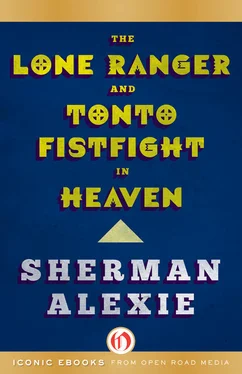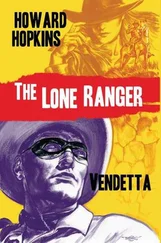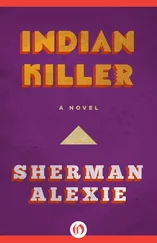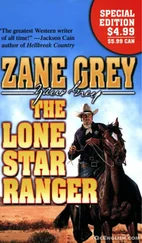“Don’t work today,” he would say. “Just for today.”
Sometimes the Indian women would take his money and work anyway. But, once in a while, one of those Indian prostitutes would take the money and go drink coffee in Denny’s all day instead of working. Those were good days for Samuel.
A year before he was fired, Samuel found a young Indian boy dead in room sixteen. Drug overdose. Samuel sat in the room and studied the boy’s face until the police arrived. Samuel wanted to know what tribe the boy was and couldn’t be sure. His eyes were Yakima but his nose was Lakota. Maybe he was mixed-blood.
When the police came and lifted the Indian boy from the bed with a tearing and stretching sound that nearly broke Samuel’s eardrums, the stories waiting to be told left and never returned. All Samuel could do after that was hum and sing songs he already knew or songs that made no sense.
At closing time, Samuel was pushed out the door into the street. He staggered from locked door to locked door, believing that any open door meant he was home. He pissed his pants. He couldn’t believe he lost his job. He climbed up an embankment and stood on the Union Pacific Railroad tracks that passed through and over the middle of the city.
Samuel was elevated exactly fourteen feet and seven inches above the rest of the world.
He heard the whistle in the distance; it sounded like horses stampeding. “I’m your horse in the night,” Samuel sang that Gal Costa song. He sang, “I’m your horse in the night.”
The whistle grew louder, angry.
Samuel tripped on a rail, fell face down on the tracks. The whistle. The whistle. The tracks vibrated, rattled like bones in a stick game. Is it hidden in the left hand or the right hand? Samuel closed his hands and his eyes.
Sometimes it’s called passing out and sometimes it’s just pretending to be asleep.
THE QUILTING
A QUIET SATURDAY RESERVATION AFTERNOON and I pretend sleep on the couch while my mother pieces together another quilt on the living room floor.
“You know,” she says. “Those stories you tell, they’re kind of sad, enit?”
I keep my eyes closed.
“Junior,” she says. “Don’t you think your stories are too sad?”
My efforts to ignore her are useless.
“What do you mean?” I ask.
She puts down her scissors and fabric, looks at me so straight that I have to sit up and open my eyes.
“Well,” she says. “Ain’t nobody cries that much, you know?”
I pretend to rub the sleep from my eyes, stretch my arms and legs, make small noises of irritation.
“I guess,” I say. “But ain’t nobody laughs as much as the people in my stories, either.”
“That’s true,” she says.
I stand up, shake my pants loose, and walk to the kitchen to grab a Diet Pepsi with cold, cold ice.
Mom quilts silently for a while. Then she whistles.
“What?” I ask her, knowing these signals for attention.
“You know what you should do? You should write a story about something good, a real good story.”
“Why?”
“Because people should know that good things always happen to Indians, too.”
I take a big drink of Diet Pepsi, search the cupboards for potato chips, peanuts, anything.
“Good things happen,” she says and goes back to her quilting.
I think for a moment, put my Diet Pepsi down on the counter.
“Okay,” I say. “If you want to hear a good story, you have to listen.”
THE STORY
Uncle Moses sat in his sandwich chair eating a sandwich. Between bites, he hummed an it-is-a-good-day song. He sat in front of the house he built himself fifty years before. The house sat down at random angles to the ground. The front room leaned to the west, the bedroom to the east, and the bathroom simply folded in on itself.
There was no foundation, no hidden closet, nothing built into the thin walls. On the whole, it was the kind of house that would stand even years after Moses died, held up by the tribal imagination. Driving by, the Indians would look across the field toward the house and hold it upright with their eyes, remembering Moses lived there .
It would be just enough to ensure survival.
Uncle Moses gave no thought to his passing on most days. Instead, he usually finished his sandwich, held the last bite of bread and meat in his mouth like the last word of a good story.
“Ya-hey,” he called out to the movement of air, the unseen. A summer before, Uncle Moses listened to his nephew, John-John, talking a story. John-John was back from college and told Moses that 99 percent of the matter in the universe is invisible to the human eye. Ever since, Moses made sure to greet what he could not see.
Uncle Moses stood, put his hands on his hips, arched his back. More and more, he heard his spine playing stickgame through his skin, singing old dusty words, the words of all his years. He looked at the position of the sun to determine the time, checked his watch to be sure, and looked across the field for the children who would soon come.
The Indian children would come with half-braids, curiosity endless and essential. The children would come from throwing stones into water, from basketball and basketry, from the arms of their mothers and fathers, from the very beginning. This was the generation of HUD house, of car wreck and cancer, of commodity cheese and beef. These were the children who carried dreams in the back pockets of their blue jeans, pulled them out easily, traded back and forth.
“Dreams like baseball cards,” Uncle Moses said to himself, smiled hard when he saw the first child running across the field. It was Arnold, of course, pale-skinned boy who was always teased by the other children.
Arnold ran slowly, his great belly shaking with the effort, eyes narrowed in concentration. A full-blood Spokane, Arnold was somehow born with pale, pretty skin and eyes with color continually changing from gray to brown. He liked to sit in the sandwich chair and wait for Uncle Moses to make him a good sandwich.
It took Arnold five minutes to run across the field, and all the while Moses watched him, studied his movements, the way Arnold’s hair reached out in all directions, uncombed, so close to electricity, closer to lightning. He did not wear braids, could not sit long enough for his mother.
Be still, be still , she would say between her teeth, but Arnold loved his body too much to remain still.
Big as he was, Arnold was still graceful in his movements, in his hands when he touched his face listening to a good story. He was also the best basketball player in the reservation grade school. Uncle Moses sometimes walked to the playground just to watch Arnold play and wonder at the strange, often improbable gifts a person can receive.
We are all given something to compensate for what we have lost . Moses felt those words even though he did not say them.
Arnold arrived, breathing hard.
“Ya-hey, Little Man,” Uncle Moses said.
“Hello, Uncle,” Arnold replied, extending his hand in a half-shy, half-adult way, a child’s greeting, the affirmation of friendship.
“Where are the others?” Uncle Moses asked, taking Arnold’s hand in his own.
“There was a field trip,” Arnold answered. “All the others went to a baseball game in Spokane. I hid until they left.”
“Why?”
“Because I wanted to see you.”
Moses smiled at Arnold’s unplanned kindness. He held the child’s hand a little tighter and pulled him up close.
“Little Man,” he said. “You have done a good thing.”
Arnold smiled, pulled his hand away from Moses, and covered his smile, smiling even harder.
Читать дальше












